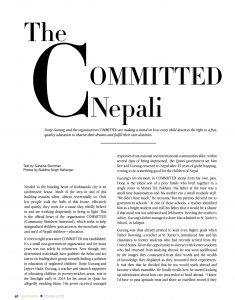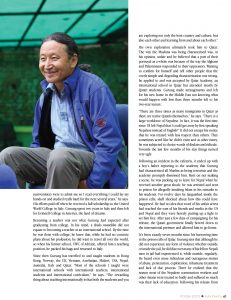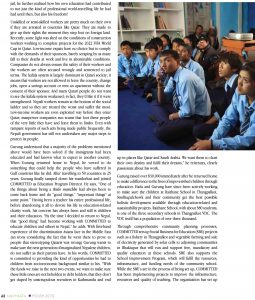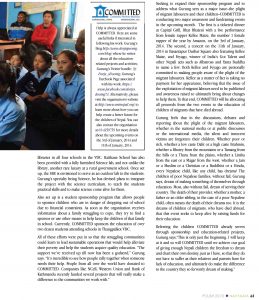Reproduced below is the text of my interview published in this month’s issue of Navyaata. Please note that links are my addition. Additionally, at the time of the interview, only two events were planned and hence the reference to only those in this piece.
* * * * * * * *
The COMMITTED Nepali
Dorje Gurung and organisation COMMITED are making a stand on how every child deserves the right to a free, quality education to charter their dreams and fulfill their own destinies.
Text by Sunaina Sherchan
Photo by Buddha Singh Maharjan

Nestled in the bustling heart of Kathmandu city is an unobtrusive house. Much of the area in and of this building remains silent, almost reverentially so. Only few people walk the halls of this house; effectively and quietly, they work for a cause they wholly believe in and are working desperately to bring to light. This is the official heart of the organisation COMMITTED (Community Members Interested), which seeks to help marginalized children gain access to the most basic right and need of Nepali children— education.
It’s been eight years since COMMITTED was established. It’s a small non-government organization and for many years was run solely by volunteers. Now though, two determined individuals have grabbed the helm and are intent on leading their group towards finding a solution to education of neglected children: Dorje Gurung and Jayjeev Hada. Gurung, a teacher and staunch supporter of educating children in poverty-stricken areas, was in the limelight early in 2013 for his arrest in Qatar for allegedly insulting Islam. His arrest received outraged responses from national and international communities alike; within several days of being imprisoned, the Qatari government set him free and Gurung returned to Nepal after 25 years of globe hopping, vowing to do something good for the children of Nepal.
Gurung’s involvement in COMMITTED stems from his own past. Dorje is the eldest son of a poor family who lived together in a single room in Moriya Tol, Pokhara. His father at the time was a small time businessman and his mother ran a small roadside stall. “We didn’t have much,” he recounts,“But my parents did send me to government schools.” At one of those schools, a teacher identified him as a bright student and told his father that it would be a shame if that mind was not cultivated and left barren. Heeding the teacher’s advice, Gurung’s father managed to have him admitted to St. Xavier’s School, in Lalitpur.
Gurung was thus already primed to seek even higher goals when Father Downing, a teacher at St. Xavier’s, introduced him and his classmates to former students who had recently arrived from the United States. Given the opportunity to interact with former students who had returned from studying abroad, he was soon spellbound by the images they constructed from their words and the wealth of knowledge they displayed as they recounted their experiences. It was then that he decided that he too would study abroad and become a thulo manchhe. He fondly recalls how he started looking up information about how one proceeded to head abroad. “I knew I’d have to pass aptitude tests and show an excellent record if they (universities) were to admit me so I read everything I could lay my hands on and studied really hard for the next several years,” he says. His efforts paid off when he received a full scholarship to the United World College in Italy. Gurung spent two years in Italy and then left for Grinnell College in America, the land of dreams.

Becoming a teacher was not what Gurung had expected after graduating from college. In his mind, a thulo manchhe did not equate to becoming a teacher at an international school. By the time he was done with college, he knew that, while he had no concrete plans about his profession, he did want to travel all over the world, so when his former school, UWC of Adriatic, offered him a teaching position , he packed his bags and returned to Italy.
Since then Gurung has travelled to and taught students in Hong Kong, Norway, the UK, Vietnam, Azerbaijan, Malawi, USA, Nepal, Australia, Italy and Qatar. “Most of the schools I taught were international schools with international teachers, international students and international curriculum,” he says. “The rewarding thing about teaching internationally is that both the students and you are exploring not only the host country and culture, but also each other and learning from and about each other.”
His own exploration ultimately took him to Qatar. The way the Muslims was being characterised was, in his opinion, unfair and he believed that a part of their portrayal as a whole was because of the way the Afghans and Palestinians responded to their oppressors. Wanting to confirm for himself and tell other people that the overly simple and degrading characterization was wrong, he applied to and was accepted by Qatar Academy, an international school in Qatar but attended mostly by Qatari students. Gurung made arrangements and left for his new home in the Middle East not knowing what would happen with less than three months left to his two-year tenure.
“There are three times as many immigrants in Qatar as there are native Qataris themselves,” he says. “There is a large workforce of Nepalese. In fact, it was the first time since I’d left Nepal that I could get away by first speaking Nepalese instead of English!” It did not escape his notice that he was treated with less respect than others. They sometimes acted like he didn’t exist and at other times, he was subjected to choice words of disdain and ridicule. Towards the last few months of his stay things turned very ugly.
Following an incident in the cafeteria, it ended up with a boy’s father reporting to the academy that Gurung had characterized all Muslim as being terrorists and the academy promptly dismissed him. Bent on not making a scene, he was packing up to leave for Nepal when he received another great shock: he was arrested and sent to prison for allegedly insulting Islam in his remarks to his students. For twelve days he languished inside the prison cells, shell shocked about how this could have happened. He had no idea that word of his unfair arrest had reached the ears of his friends and media in the US and Nepal and they were fiercely putting up a fight to set him free. After just a few days of campaigning for his release, the Qatari government finally bowed down to the international pressure and allowed him to go home.
It’s been exactly seven months since his harrowing time in the prison cells of Qatar. Gurung says that although he did not experience any form of violence whether outside or inside the jail, he did discover many of his fellow Nepali men in jail had experienced it, while outside, regularly. He heard even more ridiculous and outrageous stories of abuse, persecution, exploitation, inhumane treatment and lack of due process. There he realized that the reason most of the Nepalese construction workers and other Asians were treated so badly and suffered so much was their lack of education. Following his release from jail, he further realized how his own education had contributed to not just the kind of professional world-travelling life he had had until then, but also his freedom

Unskilled or semi-skilled workers are pretty much on their own if they are arrested in countries like Qatar. They are made to give up their rights the moment they step foot on foreign land. Recently, some light was shed on the conditions of construction workers working to complete projects for the 2022 FIFA World Cup in Qatar. Low-income expats have no choice but to comply with the demands of their sponsors, barely scraping by as many fall to their deaths at work and live in abominable conditions. Companies do not always ensure the safety of their workers and the workers are often accused wrongly and sentenced to jail terms. The kafala system is largely dominant in Qatari society; it means that workers are not allowed to leave the country, change jobs, open a savings account or rent an apartment without the consent of their sponsor. And many Qatari people do not want to see the kafala system weakened; in fact, they’d like it if it were strengthened. Nepali workers remain at the bottom of the social ladder and so they are treated the worst and suffer the most. Low-income workers are even exploited way before they enter Qatar; manpower companies run scams that loot these people of the very little they have and leave them in limbo. Even with rampant reports of such acts being made public frequently, the Nepali government has still not undertaken any major steps to protect its people.
Gurung understood that a majority of the problems mentioned above would have been solved if the immigrants had been educated and had known what to expect in another country. When Gurung returned home to Nepal, he vowed to do something that could help the people who have suffered in Gulf countries like he did. After travelling to 50 countries in 25 years, Gurung finally tamped down his wanderlust and joined COMMITTED as Education Program Director. He says, “One of the things about being a thulo manchhe had always been to come back home and do “good things,” “important things” at some point.” Having been a teacher his entire professional life, before abandoning it all to devote his life to education-related charity work, his concern has always been and still is children and their education. “By the time I decided to return to Nepal, that “good thing” had become working with COMMITTED to educate children and others in Nepal,” he adds. With first-hand experience of the discrimination Asians face in the Middle East (an irony considering the fact that he went there to prove to people that stereotyping Qataris was wrong) Gurung wants to make sure the next generation of marginalized Nepalese children, do not suffer as their parents have. In his words, COMMITTED is committed to providing the kind of opportunities he had to children from socioeconomic background similar to his. “With the funds we raise in the next two events, we want to make sure these little ones are not beholden to debt holders, that they don’t get duped by unscrupulous recruiters in Kathmandu and end up in places like Qatar and Saudi Arabia. We want them to chart their own destiny and fulfil their dreams,” he reiterates, clearly passionate about his work.
Gurung raised over $30,000 immediately after he returned home to make a difference in the lives of impoverished children through education. Hada and Gurung have since been actively working to make sure the children at Raithane School in Thangpalkot, Sindhupalchowk and their community get the best possible holistic development available through education-related and sustainability projects. Raithane School, with about 380 students, is one of the three secondary schools in Thangpalkot VDC. The VDC itself has a population of over three thousand.
Through comprehensive community planning processes, COMMITTED sets up Social Business for Education (SBE) projects such as a fishery in Thangpalkot and vegetable farming and sale of electricity generated by solar cells to adjoining communities in Bhaktapur that will run and support free, mandatory and quality education at these schools. SBE also supports the School Improvement Program, which will fulfil the resources, infrastructure, and funding needs of the community school. While the SBE’s are in the process of being set up, COMMITTED has been implementing projects to improve the infrastructure, resources and quality of teaching. The organization has set up libraries in all four schools in the VDC. Raithane School has also been provided with a fully furnished Science lab, and not unlike the library, another rare luxury at a rural government school. Once set up, the SBE is envisioned to serve as an outdoor lab to the students. Gurung’s specialty being Science, he has devised plans to integrate the project with the science curriculum, to teach the students practical skills and to make science come alive for them.

Also set up is a student sponsorship program that allows people to sponsor children who are in danger of dropping out of school due to financial constraints. As soon as the organization receives information about a family struggling to cope, they try to find a sponsor or use other means to help keep the children of that family in school. Currently, COMMITTED sponsors the education of over two dozen students attending schools in Thangpalkot VDC.
All of these efforts were put in so that the struggling communities could learn to lead sustainable operations that would help alleviate their poverty and help the students acquire quality education. “The support we’ve received up till now has been a godsend,” Gurung says. “It’s incredible to see how people rally together when someone needs their help. People from all over the world have donated to COMMITTED. Companies like NCell, Western Union and Bank of Kathmandu recently funded several projects that will really make a difference to the communities we work with.”
Seeking to expand their sponsorship program, and to address what Gurung sees as a major issue–the plight of migrant labourers and their children–COMMITTED is conducting two major awareness and fundraising events in the upcoming month. The first is a ticketed dinner at Capital Grill, Bhat Bhateni with a live performance from female rapper Kellee Maize, the number 1 female rapper of the year by Amazon, on the 3rd of January, 2014. The second, a concert on the 11th of January, 2014 in Basantapur Durbar Square also featuring Kellee Maize, and Feyago, winner of India’s Got Talent and other Nepali acts such as Albatross and Yama Buddha to name a few. Both Kellee and Feyago are personally committed to making people aware of the plight of the migrant labourers. Kellee as a matter of fact is taking no payment for her appearance, believing that the issue of the exploitation of migrant labours need to be publicised and awareness raised to ultimately bring about changes to help them. To that end, COMMITTED will be allocating all proceeds from the two events to the education of children of migrants that have died abroad.
Gurung feels that in the discussions, debates and reporting about the plight of the migrant labourers, whether in the national media or at public discourses or the international media, the silent and innocent victims are forgotten: their children. Whether poor or rich, whether a low caste Dalit or a high caste Brahmin, whether a Bhote from the mountains or a Tamang from the hills or a Tharu from the plains, whether a Limbu from the east or a Magar from the west, whether a Jain or a Muslim or a Christian or a Buddhist or a Hindu, every Nepalese child, like any child, has dreams! The children of poor Nepalese families, without fail, Gurung says, dream of making something of themselves through education. Most, also without fail, dream of serving their country. The death of their provider, whether a mother, a father or an older sibling, in the case of a poor Nepalese child, often means the death of their dreams too. It is the dreams of children of migrants, who have died abroad, that this event seeks to keep alive by raising funds for their education.
Referring the children COMMITTED already serves through sponsorship and education-related projects, Gurung says,“This is only just the beginning. I will keep at it and so will COMMITTED until we achieve our goal of giving enough Nepali children the freedom to dream and chart their own destiny, just as I have, so that they do not have to suffer as their relatives and parents have for lack of education, and ultimately do make the difference to the country they so fervently dream of making.”
Help is always appreciated at COMMITTED. Here are some useful links if interested in following his work: Gurung’s blog https://www.dorjegurung.com/blog/ where he writes about all the education-related projects and activities; Gurung’s Twitter handle: @Dorje_sDooing; Gurung’s Facebook Page associated with his work: https://www.facebook.com/dorjes.dooing73. Alternatively, please visit the organisation’s website at http://www.cminepal.org/ to learn more about how you can help create a better future for the children of Nepal. You can also contact the organisation at 01-4259759 for more details about the upcoming events on the 3rd of January, 2014 and 11th of January, 2014.
